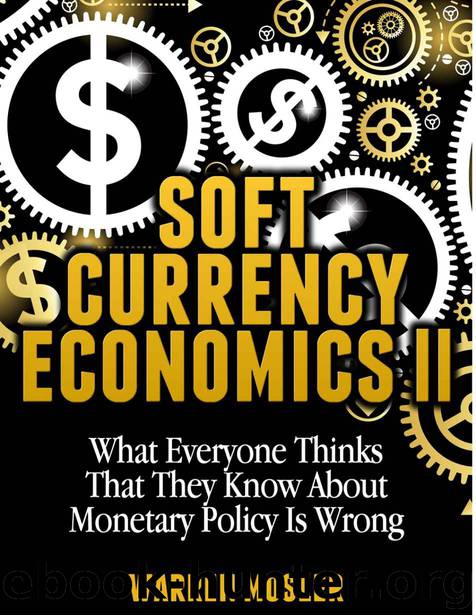Soft Currency Economics II (Modern Monetary Theory) by Warren Mosler

Author:Warren Mosler [Mosler, Warren]
Language: eng
Format: epub
Published: 2012-10-24T22:00:00+00:00
Failure to Meet Reserve Requirements
Another form of borrowed reserves occurs when a bank has a reserve deficiency. If a bank fails to meet its reserve requirement it is subject to a reserve-deficiency charge. Reserve banks are authorized to assess charges at a rate of 2% above the discount rate. Thus, the Fed provides a third minor source of reserves for banks unable to acquire the required level of reserves from the fed funds market or the discount window.
The Fed Funds Market
The Fed funds market is a means by which banks can obtain funds from other banks or nonbank lenders such as U. S. government agencies, savings and loan associations, mutual savings banks, or an agency or branch of a foreign bank. Federal funds are unsecured bank loans. Federal funds do not belong to the federal government as the name might suggest. Fed funds are not subject to reserve requirements; they are, in effect, reserves traded among financial institutions.
Member banks have reserves in the Fed which are also known as immediately available funds since they can be transferred almost instantaneously over Fedwire. Fedwire is the Federal Reserve's system that electronically transfers funds and securities on its communications network. Money and securities are no more than accounting data. A bank can access its account at its Reserve Bank to transfer funds or securities to any other depository institution that has a Reserve Bank account. When banks borrow fed funds they are actually borrowing deposits from other banks. The transfer of fed funds increases the deposits at the borrowing bank and reduces deposits at the lending bank. Most fed funds borrowing is for one day; essentially these borrowings are one-day unsecured loans.
Banks could obtain funds by selling Treasury bills, either outright or as reverse repos, but for one day or a few days such sales are less convenient and slightly more costly than fed funds. No matter what the method of acquiring funds, bank reserves are simply transferred from one bank to another. Interbank reserve transactions change the location of reserves but do not alter the total amount of reserves held in the banking system.
Banks may obtain funds in the fed funds market to maintain their reserve requirement. They have lines of credit with each other to enact direct transfers of funds. Banks have been known to borrow fed funds continuously and in excess of their reserve requirement when it is profitable to do so. Banks may borrow beyond their reserve requirement and lend the borrowed funds at higher rates than the cost of borrowing. The difference between a bank's cost of money and the return on loans determines its willingness to lend. The cost of money defines the cost of loans, and thus the demand for loans.
Download
This site does not store any files on its server. We only index and link to content provided by other sites. Please contact the content providers to delete copyright contents if any and email us, we'll remove relevant links or contents immediately.
International Integration of the Brazilian Economy by Elias C. Grivoyannis(99856)
The Radium Girls by Kate Moore(11980)
Turbulence by E. J. Noyes(7983)
Nudge - Improving Decisions about Health, Wealth, and Happiness by Thaler Sunstein(7664)
The Black Swan by Nassim Nicholas Taleb(7065)
Rich Dad Poor Dad by Robert T. Kiyosaki(6523)
Pioneering Portfolio Management by David F. Swensen(6263)
Man-made Catastrophes and Risk Information Concealment by Dmitry Chernov & Didier Sornette(5960)
Zero to One by Peter Thiel(5737)
Secrecy World by Jake Bernstein(4707)
Millionaire: The Philanderer, Gambler, and Duelist Who Invented Modern Finance by Janet Gleeson(4427)
The Age of Surveillance Capitalism by Shoshana Zuboff(4253)
Skin in the Game by Nassim Nicholas Taleb(4208)
Bullshit Jobs by David Graeber(4145)
The Money Culture by Michael Lewis(4143)
Skin in the Game: Hidden Asymmetries in Daily Life by Nassim Nicholas Taleb(3965)
The Dhandho Investor by Mohnish Pabrai(3729)
The Wisdom of Finance by Mihir Desai(3700)
Blockchain Basics by Daniel Drescher(3544)
